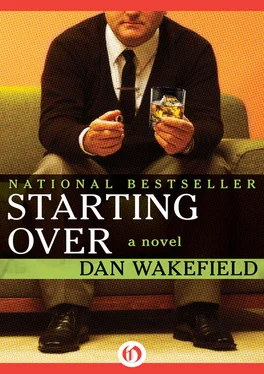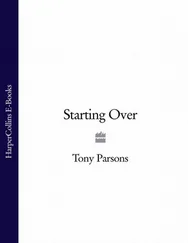“There’s something I have to tell you,” Marilyn said.
They had recovered from the commune trip, and were lolling around Marilyn’s apartment Sunday afternoon, talking of the coming events of the great holiday season.
“Jesus,” Potter said, “not you! ”
“What’s wrong?”
“Everytime a woman says, ‘There’s something I have to tell you,’ it’s bad news. It’s the clap, or it’s going into the convent, or it’s Aunt Tillie’s coming to stay for a month and of course she doesn’t know I have lovers. The last time I heard that, it was the woman who told me her husband wasn’t dead she just wished he was dead.”
“God, you don’t have to get so—overwrought.”
“I don’t, huh? OK. Then just tell me what the thing is you have to tell me, and we’ll see how overwrought I have to get.”
Marilyn got up to make herself a new drink. “Want yours freshened?” she asked solicitously.
“Now I know it’s bad,” he said.
“Don’t be silly.”
She fixed the drinks, sat down, and looked at Potter with a tenuous smile.
“I’m waiting,” he said.
Marilyn lit a cigarette.
“I’m waiting for the worst, so you might as well hit me with it,” Potter said.
“Listen, Phil, you’re making a big commotion about nothing. All it is—the only thing is—I have to go away for a few days.”
“Away? Where? For what?”
“Well. You remember my mother. In Florida?”
“You mentioned you had one there.”
“Well, she’s very old, and she isn’t well, and she wrote this really pathetic sort of letter begging me—really begging me—to come down and visit her.”
“I thought you hardly saw her anymore.”
“I don’t, hardly. That’s just it. I haven’t seen her for a couple of years. More than two. She’s all alone down there, and if she dies and I haven’t seen her it will really be terrible. Dr. Shamleigh said if that happened I’d feel horribly guilty, I’d probably go into some deep depression.”
“That asshole.”
“I know he is, but he may be right about this. It’s just for a few days, and then it will be off my conscience.”
Potter’s eyes narrowed to a squint. “ Which few days?” he asked.
“Well,” she said lightly, not looking at him directly, “I thought I could leave on the twenty-fourth and get back on the twenty-sixth. It’s just two nights and three days, altogether.”
“It’s Christmas!” Potter screamed. “It’s Christmas and Christmas Eve! You bitch, you goddamn bitch! I thought we were allies! I thought we were friends!”
“We are , Phil, we are —”
“And you’re leaving me alone on Christmas and Christmas Eve, two of the worst fucking times of all, two of the hardest days of the whole rotten holidays!”
“You think it’s pleasure for me? ” she yelled back. “You think I’m going to have it easy getting through Christmas in a fucking trailer park with my hysterical, alcoholic mother rolling herself around in a wheelchair, and singing Deck the Halls and all that crap? Getting soused and crying about my father gone to the great Christmas in the sky?”
“OK,” he said. “OK. I’m sorry.”
He sat down beside her on the couch, and they put their arms around each other, comforting.
“You’ll make it through,” she said. “I know you’ll make it.”
“So will you, kid. Listen, I got confidence in you.”
On the day of Christmas Eve, Potter didn’t want to leave the house. He had the Bertelsen party to go to at six, but he didn’t want to risk wandering around Cambridge or Boston before that. The pitch of the season would soon reach its jolly crescendo of wassail and song, before the stone silence of the holy day itself. This was the last chance for shopping and bustling around on merciful missions and the streets would be full of cheerily fake Dickensian characters with long, colored scarves and clown-red noses. The streetcorner Santas would be jingling their bells to hell and gone, those bells that were tuned to penetrate your skull and harangue your brain with their silver insistence to give give give , and the shivering Salvation Army combos would be bleating their baleful brass versions of the carols, managing to make a dirge out of “Joy to the World.”
Potter had a container of low-fat peach yogurt and a cup of Tastemaker instant freeze-dried coffee for his noon breakfast, and turned on the daytime soap operas. He had started watching the soaps on television the Monday after vacation began. It was the first time in his life he had resorted to this, and he drew the venetian blinds shut in the living room and kept the volume low, fearing someone would find him out. He figured it was the ultimate degradation. But of course it was not. Whenever you think you’ve found the ultimate degradation, you soon find ways to elaborate on it, new refinements and improvements to add. Potter started sipping Scotch and sodas while he watched, and used the commercial breaks to run to the kitchen for freshening the drink or getting more ice. But this still left many commercial breaks in which he had nothing special to do, and his mind would begin to slide back to reality. To combat this, Potter took to keeping the Globe crossword puzzle in his lap, so that whenever the story was interrupted by a commercial, he could immediately focus his mind on the puzzle. But after a few days of doing this, he discovered he was finishing the puzzle too fast—that is, before the last soap was finished—which allowed his thoughts to go free again during the remaining commercials. He solved this new dilemma by going to the big magazine stand in Harvard Square and buying up a bunch of Crossword Puzzle magazines. He slipped away surreptitiously with them, hiding them beneath a Boston Globe , as guilty as if he were carrying hardcore pornography.
Potter was at first surprised to find he liked the soaps, that he found them far more credible than any of the dramatic series on nighttime television; their slow, nagging pace of problems and misunderstandings and high-strung, headache-y conflicts were far more typical of daily life as he knew it and saw it around him than the adult evening TV dramas or the quick-image flashings and clean resolutions of the hip new movies.
The episodes he watched on the day of Christmas Eve made him a confirmed fan forever. They seemed to him the only honest portrayals of the whole, hidden horror of the season.
On one of the shows, a troubled young college student went to the home of his favorite professor and his wife, confessing that he didn’t have the guts to go home and visit his parents for Christmas. The professor and wife urged him to brave it, saying how much it would mean to his parents, how hurt they would be if he didn’t come. Suddenly a strange smile crossed the face of the troubled young man, and he said, “Well, maybe there is a way. A way that would give me the courage to do it.” The prof clapped him on the back, and the sympathetic wife smiled syrup at him. In the next scene the young man sat alone in the living room of his fraternity house. A knock came at the door, and the student let in a suspicious-looking man with dark, slicked-back hair and the collar of his overcoat turned up. The student took off his jacket, and rolled up his sleeve. The pusher got out his works and gave the young man a fix. A Christmas fix. The young fellow smiled beatifically. He could make it home for Christmas now! Over the river and through the woods.
Potter laughed out loud, and got himself a new drink. He sat at the tube engrossed all afternoon, as the real traumas of the holiday were enacted. Deserted wives wept at piano bars while listening to “White Christmas,” husbands explained to lonely mistresses they had to hurry home to the wife and children, idealistic interns tried to comfort patients whose cases were hopeless and later cried their hearts out to lovesick nurses. Young married couples argued bitterly over whether the in-laws who tried to stop the wedding should be given a day of amnesty on Christmas and forgiven with a visit, while unwed mothers shoplifted dolls for their deserted little babes and amnesia victims in far-off flophouses were stricken with flashbacks of former happy holidays in lives whose location they could no longer place.
Читать дальше












